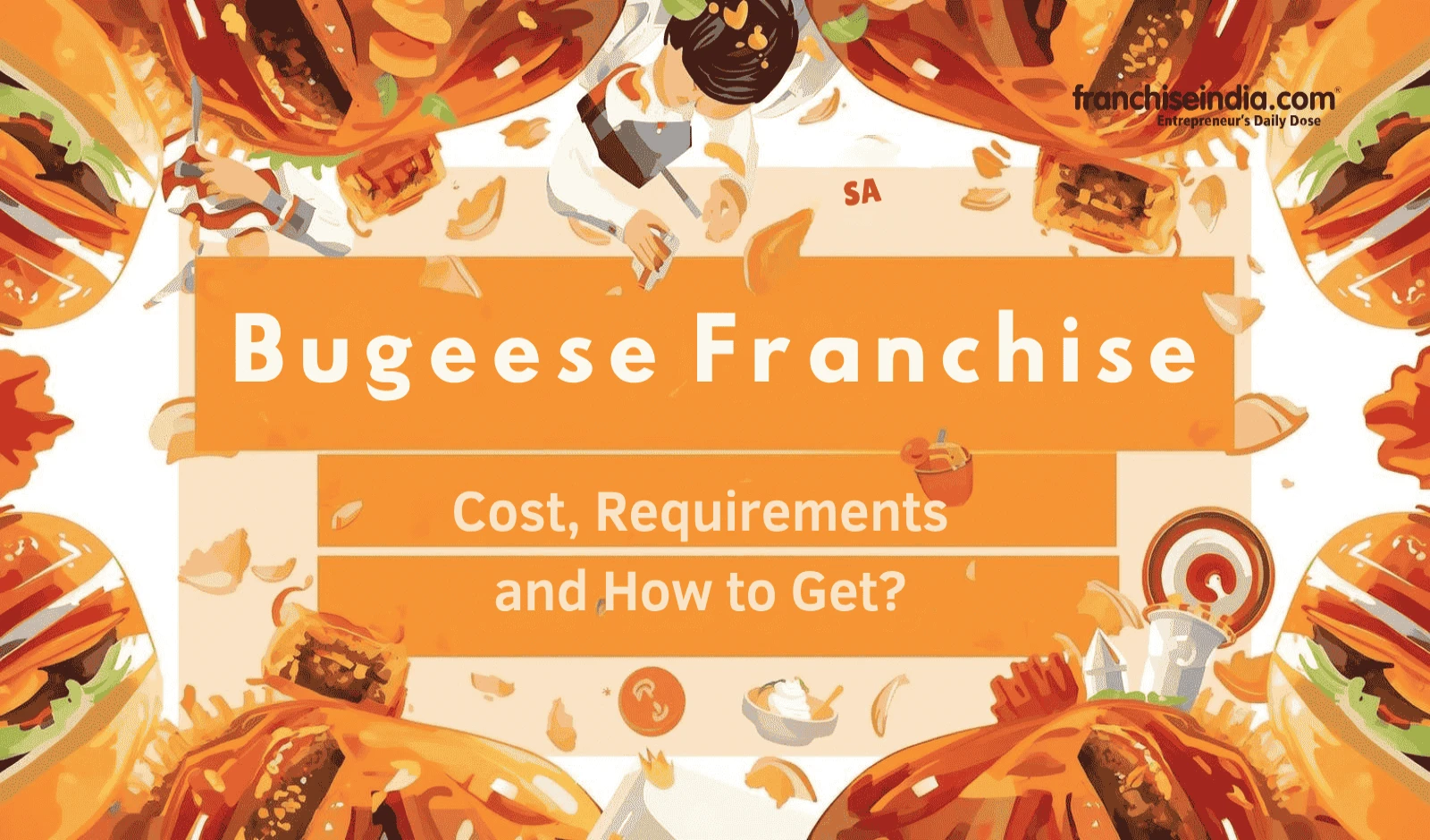
The Indian food service industry is controlled by regional powerhouses and creative, niche Quick Service Restaurants (QSRs) that understand local flavours. and customer budgets better than global behemoths that dominate the Indian food service industry. A brand like Bugeese, which represents a specialised, growing QSR or bakery chain that provides an exciting entry point for first-time entrepreneurs and experienced investors looking for high-growth potential with manageable initial capital.
Franchising is the quickest way to scale a proven food concept. By purchasing a franchise, you bypass the risky phase of brand building, product development, and operational trial and error. Instead, you instantly gain access to a ready-made business model, standardised supply chains, and proven marketing methods.
This comprehensive guide breaks down the estimated costs and outlines the non-negotiable requirements and the step-by-step approach to launching a Bugeese franchise unit.
Also read: 7 profitable business ideas under INR 5 lakhs
Estimated Bugeese Franchise Cost Breakdown
.png)
The total investment for securing and setting up a single Bugeese franchise unit is highly dependent on the store format (kiosk, takeaway, or dine-in) and the city (tier 1 vs. tier 2).
Estimated Total Investment: It typically ranges between ₹15 lakhs to ₹35 lakhs.
1. Initial Franchise Fee
This is a one-time, non-refundable fee that you pay for the right to use their brand name, access their Standard Operating Procedures (SOPs), and use their recipes.
Estimated Cost: ₹5 Lakhs to ₹10 Lakhs.
2. Store Setup and Interiors
This is the largest variable cost, covering the transformation of a shell space into a branded, functional QSR unit. QSR franchises have strict guidelines for their aesthatics and store setup design.
Requirements: Flooring, lighting, branded signage, counter fabrication, seating (if dine-in), and wall finishing.
Estimated Cost: ₹6 Lakhs to ₹12 Lakhs (for a 250 to 500 sq. ft. unit).
3. Kitchen Equipment and Machinery
This includes essential commercial-grade equipment tailored to the QSR menu.
Requirements: Commercial burners, ventilation hood, refrigerators and freezers, POS (Point of Sale) system, and specialized mixers/grinders/prep tables.
Estimated Cost: ₹4 Lakhs to ₹7 Lakhs. The franchisor often mandates specific vendors for quality control.
4. Working Capital and Pre-Operational Costs
This mandatory reserve fund covers immediate expenses before the store becomes profitable.
Initial Inventory: Cost of the first month's raw materials, ingredients, and packaging.
Pre-Opening Marketing: Local promotion, pamphlet distribution, and launch event.
Staff Training: Cost of sending managers for mandatory franchisor training and initial staff payroll.
Estimated Cost: ₹3 Lakhs to 6 Lakhs (excluding the refundable security deposit for the rent).
Also read: 7 Eco-friendly business ideas in India
Ongoing Fees: Sustaining the Partnership
In addition to the initial setup, the franchisee must pay continuous fees to the franchisor:
| Fee Type | Basis | Estimated Percentage | Purpose |
|---|---|---|---|
| Royalty Fee | Percentage of Gross Monthly Sales | 5% to 8% | Ongoing operational support, R&D, and brand usage rights. |
| Marketing Fee | Percentage of Gross Monthly Sales | 1% to 3% | Contribution to centralized brand building, digital marketing, and promotions. |
Essential Requirements for Franchisee Eligibility
1. Financial and Liquidity Requirements
Before establishing positive cash flow, the franchisor needs assurance that the franchisee can withstand the initial operational curve (typically 3 to 6 months).
Total Net Worth: A minimum net worth of ₹50 lakhs is preferred.
Liquid Capital: You must have access to 50% of the total investment that is available in funds.
Creditworthiness: A strong credit score is essential for securing working capital loans or bank guarantees, if needed.
2. Operational and Management Commitment
The food industry is hands-on. Franchisors of expanding businesses prefer active partners over passive investors.
F&B Experience (Preferred): Having a prior experience in quick-service is a plus but not mandatory.
Active Involvement: You must commit to being the active managing partner or appointing a dedicated, full-time manager to oversee daily operations, quality control, and customer service.
3. Real Estate and Location Criteria
Location is the single most critical factor for a QSR's success. Bugeese will have strict criteria for approval:
Type of Location: High-traffic retail locations—inside malls, near cinema complexes, major food courts, primary high streets, or near large educational/corporate centers.
Minimum Size: Generally 200 to 500 square feet of carpet area.
Also read: 12 unique business ideas for women in India
How to Get the Bugeese Franchise: The 4-Stage Acquisition Roadmap
Acquiring an emerging franchise requires professionalism and a deep understanding of the agreement.
Phase 1: Initial Inquiry and Prequalification
Visit their official website and fill out the formal franchise agreement and submit it through their corporate website only. You will be asked for your personal information, like your financial capacity, business experience and proposed market or location.
Once you are pre-qualified, you must sign an NDA before receiving proprietary information, which will include the detailed financial projections or the official Franchise Disclosure Document (FDD).
Phase 2: Submission and Due Diligence
After you complete the detailed application package, this will include the comprehensive financial verifications, background checks and detailed resumes of all investors. You must present a detailed business plan which includes a comprehensive financial statement verification, background checks, and detailed resumes of all principal investors. You can expect multiple rounds of interviews with the franchise development team. Submit a detailed, localized business plan. This plan must cover:
5-Year Financial Projections (Profit & Loss statements).
Competitive analysis for your city.
Local Marketing Strategy (How you will drive foot traffic).
Phase 3: Site Approval and Legal Agreement
You can expect multiple site visits and demographic analysis by the corporate real estate team. Only sites approved by Bugeese are valid. You can hire a specialized franchise attorney to review the lengthy franchise agreement. After the final approval of your business plan and the agreement is signed, you will pay the initial non-refundable franchise fee.
Phase 4: Training, Construction, and Launch
You and your team must attend mandatory, intensive training sessions at a corporate training centre. The franchisor will provide you the blueprint of the store design and vendor specifications. A corporate launch team will often be deployed to your location for 1 weeks prior to the opening to oversee final staff training and inventory stocking and ensure all systems are 100% compliant.
After everything is done, they will help you in store launch, under strict corporate guidance, marking the start of your royalty payments and your journey as a Bugeesefranchisee.
Also read: Burger Point franchise: cost, profit and requirements
The Profit Potential: Maximizing Your QSR ROI
To ensure the high ROI promised by the franchise model, focus on these three operational areas:
1. Supply Chain Discipline
Follow the franchisor's approved vendor list to the letter. While local sourcing may appear to be cheaper, using unapproved ingredients risks product inconsistency and potential penalties, eventually harming brand reputation and sales volume.
2. Efficiency in Labor Management
QSR profit margins are sensitive to labour expenses. In order to reduce downtime and manage payroll costs, cross-train staff on multiple tasks (e.g., counter service, simple prep work) and adjust the schedule to coincide with peak hours.
3. Digital Sales and Delivery Integration
Walk-in traffic is not enough for a modern QSR. Prioritize integration with major food delivery aggregators (Swiggy, Zomato) and allocate a percentage of your first marketing budget to hyper-local digital advertising (Google Maps, Instagram ads) that targets the 3–5 km radius surrounding your restaurant.
The Bugeese Investment Opportunity
A smart investment opportunity in the steady, high-growth quick service restaurant sector is provided by the Bugeese franchise. The ability to launch with an initial investment typically ranging from ₹15 Lakhs to ₹35 Lakhs, backed by a tested brand and functional system, reduces risk while optimising the possibility of a quick return on investment (ROI).
Success depends on acquiring a high-traffic site and maintaining absolute quality control as mandated by the franchisor and capitalising on the agreement's immediate brand awareness.
You might also like: The 10 Best Burger Franchises in India (2025)

